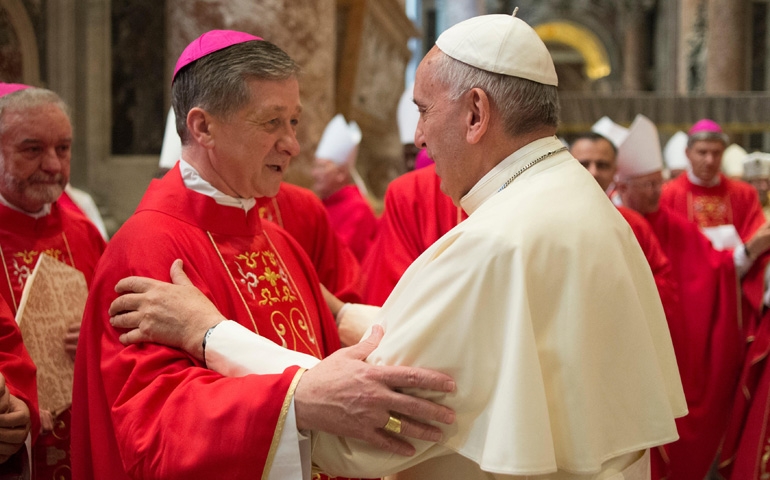Let’s say I get caught up in the moment and, under the influence of booze and Donald Trump’s quip that he “could stand in the middle of 5th Avenue and shoot somebody and I wouldn’t lose voters,” I walk out onto 5th Avenue (the one in the small town where I live) and shoot somebody. The police station is right there, and let’s say some astonished cop walks over and cuffs me, and that I’m subsequently tried, convicted, and sent to Sing Sing, which for me is – un-metaphorically – “up the river” from here.
Let’s say that in prison I’m plenty sober now and that I spend time in counseling with a priest, and that I become truly repentant. I confess my violation of the 5th Commandment, and the priest is satisfied with my repentance and gives me absolution. I am forgiven.
No matter how much longer I spend in the clink, I am, in the most important sense, a free man.
Finally, let’s say that word of my conversion/forgiveness spreads – the New York Times does a front-page story – and other slightly unhinged fellows begin thinking: Hey, I could finally shoot my boss (wife, girlfriend, bowling buddy – take your pick), go to prison and still go to heaven!
Would murders increase as a result?
No. The penalty of 25-to-life (let alone of execution) is simply too great. Besides, most people possess an intuitive understanding that murder is wrong.
These musings are occasioned by the pope’s recent end-of-the-Holy-Year apostolic letter in which he mandates the universal practice of forgiving the sin of abortion.
I henceforth grant to all priests, in virtue of their ministry, the faculty to absolve those who have committed the sin of procured abortion. The provision I had made in this regard, limited to the duration of the Extraordinary Holy Year, is hereby extended.

Will this decision increase the incidence of abortions among Catholic women? Probably not, although the fact that in his letter the pope also said he restates “as firmly as I can that abortion is a grave sin,” the possibility has to be considered that his modification of canonical procedures on abortion and absolution will potentially have the effect of weakening the gravity of the sin in the minds of young Catholics: women and men.
Why? Because abortion is already in most countries legal and widespread – a part of the secular legal culture in which we live. Even if Cardinal Blase Cupich sort of condemns abortion, Barack Obama “praises” it, in the sense that he has done all any president could do to protect abortion: in supporting Planned Parenthood (“Thank you, God bless you”) and in mandating abortion coverage in health-care plans. And Obama has as much if not more influence these days on American attitudes about abortion than do Cupich or Pope Francis.
And when the pope’s comments pass quickly to forgiveness without a strong condemnation of the evil of abortion, as have his comments regarding adultery in the context of those divorced and remarried without annulment, he – unintentionally, I’m sure – diminishes the potency of Catholic teaching vis-à-vis the developing culture, public and personal.
By “developing culture,” I’m referring to the ever-clearer phenomena of preference cascades moving societies away from their traditional rootedness. It doesn’t really matter what those roots are – or were (whether in the United States or in China) – but it matters terribly if cascades of new preferences begin uprooting and destabilizing everyday life.
It may be overstating the fact, but we’re near the point at which it’s all but impossible to make a public case against abortion, not just because infanticide is embodied in law but also because “official” opposition to the law is equivocal. By “official,” I mean those who can make the case against baby murder, but are not doing is ways sufficiently forceful so as to tips the scales towards “life.”
To be blunt: Having lost the legal fight against abortion, bishops (including the Bishop of Rome) have refocused their attention on pragmatic approaches to battles in which they have the assent of ruling elites. Immigration and poverty are two examples; ones in which the views of most bishops and many politicians converge. Never mind that most of those politicians are the ones who oppose the Church on everything except immigration and poverty.
If abortion now becomes for Catholics in the confessional a sin no more problematic than contraception, masturbation, or petty theft, there is a risk that the Church’s opposition to it will no longer have sufficient weight to affect the number of abortions.
Again, it may be that few women with “unwanted” pregnancies will now overcome innate opposition to abortion simply because they believe that, afterward, a “painless” absolution will quickly restore them to grace. But looking at the direction Pope Francis is following in all matters concerning sexual ethics and at the trend towards making Catholicism a social philosophy that is liberation theology reimagined without explicitly Marxist trappings, I do worry that the Faith is being reduced to a Third Way in competition with socialism and capitalism.
This is a problem, because Catholicism, by being Christ’s church, represents THE Way.
And it’s a problem because this is Pope Francis, about whom one now asks: What’s next?















